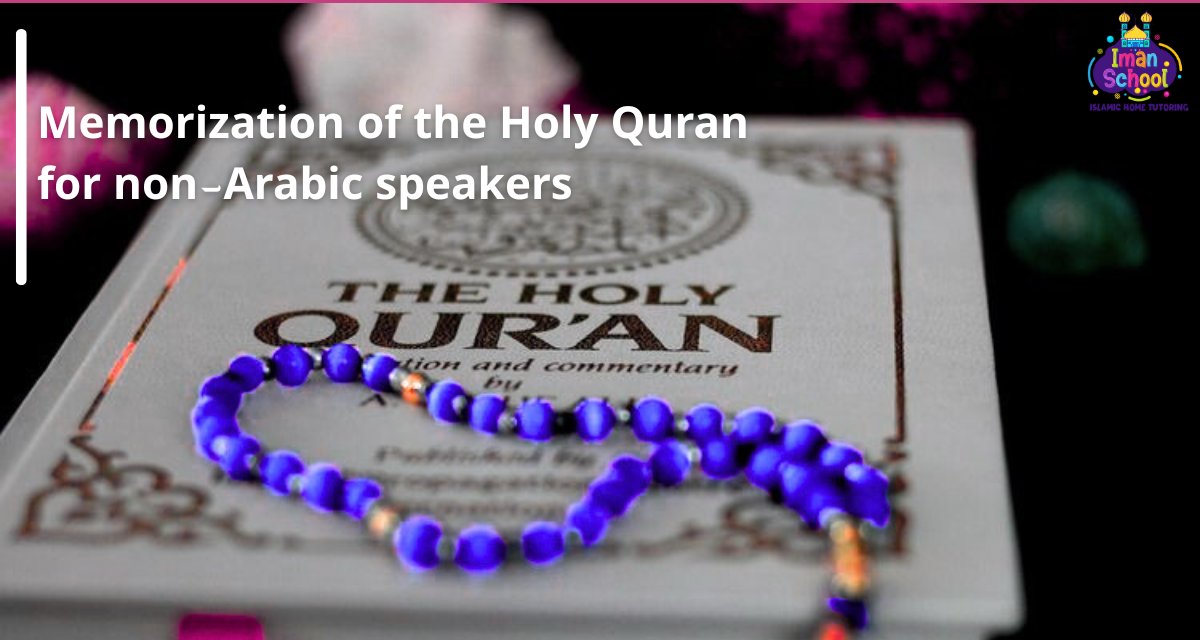The memorization of the Holy Quran for non-Arabic speakers is a journey that many Muslims around the world embark on, despite Arabic not being their native language. The Quran is considered the literal word of Allah, and its memorization is a noble and rewarding practice that brings immense spiritual benefits. While memorizing the Quran can seem challenging, especially for those who are not familiar with the Arabic language, it is certainly achievable with dedication, the right resources, and effective strategies.
In this guide, we will explore various methods and tools available for non-Arabic speakers to memorize the Holy Quran successfully. Whether you’re just starting out or looking to refine your skills, this article will provide you with helpful tips, resources, and practical advice on how to begin the memorization of the Quran effectively.
What is Memorization of the Holy Quran?
Memorization of the Holy Quran refers to the process of committing the entire Quran or parts of it to memory. In Islam, this act is known as Hifz. The Quran consists of 114 chapters (Surahs) and over 6,000 verses (Ayahs), and memorizing it is a highly esteemed achievement. The process of Quran memorization requires consistency, focus, and a good understanding of the text.
For non-Arabic speakers, this process can be a little more challenging, as Arabic is a complex language with different sounds and rules that may not exist in their native language. However, with the right tools and approach, memorization of the Holy Quran for non-Arabic speakers is not only achievable but can also be a spiritually enriching experience.
Why Memorization of the Quran is Important for Non-Arabic Speakers
Memorizing the Quran holds great importance for Muslims, and this extends to non-Arabic speakers as well. Here are some reasons why memorizing the Quran is significant:
Spiritual Reward and Closer Connection to Allah
Memorizing the Quran brings immense spiritual benefits. Each verse memorized connects you more deeply to Allah’s word, and memorizing the Quran brings a sense of fulfillment and peace.
A Source of Blessing
It is said that for every letter recited from the Quran, a person is rewarded. By committing the Quran to memory, a person not only gains spiritual rewards but also enriches their life through constant connection to the word of Allah.
Guidance for Life
The Quran provides guidance for all aspects of life. By memorizing its verses, non-Arabic speakers gain access to this guidance in their daily lives and strengthen their understanding of Islam.
Preserving the Quranic Tradition
The memorization of the Holy Quran has been a key part of Islamic tradition since the time of the Prophet Muhammad (PBUH). As non-Arabic speakers, memorizing the Quran allows us to contribute to the preservation of this rich tradition.

How to Memorize the Quran for Non-Arabic Speakers
Memorizing the Quran can seem like a daunting task for non-Arabic speakers, but with the right approach and mindset, it can be accomplished. Here are some effective tips for how to memorize Quran for non-Arabic speakers:
1- Start with Learning Basic Arabic Pronunciation and Grammar
Before diving into the memorization of the Quran, it’s helpful for non-Arabic speakers to understand the basics of Arabic pronunciation and grammar. Learning the alphabet, sounds, and rules of Quranic phonetics is crucial to correct pronunciation and understanding.
2- Break It Down into Manageable Portions
Rather than trying to memorize the entire Quran at once, break it down into smaller, more manageable portions. Start with the shorter chapters (Surahs) like Surah Al-Fatiha, Surah Al-Ikhlas, and others that are often recited in daily prayers. Once you’ve memorized these, gradually move on to the longer Surahs.
3- Use Repetition and Consistency
Repetition is key to Quran memorization. Set aside a specific time each day to review and memorize verses. Repetition helps reinforce memory and ensure that the verses stay in your mind.
4- Listen to the Quran Regularly
Listening to recitations of the Quran can significantly aid in the memorization process. Quran memorization apps and websites often provide audio recitations with clear pronunciation. Listening to these recitations repeatedly will help you internalize the proper pronunciation and rhythm of the Quranic verses.
5- Write It Down
Writing out the Quranic verses you are memorizing can reinforce your learning. It is proven that the act of writing helps solidify memory. You can write out the verses multiple times or make flashcards to test your memory.
6- Recite What You Memorized Regularly
To retain what you’ve memorized, recite it during your daily prayers or throughout the day. Regular recitation will help keep the verses fresh in your mind and ensure that you don’t forget what you’ve learned.
The Role of Tajweed in Quranic Memorization for Non-Arabic Speakers
Tajweed refers to the set of rules governing the proper pronunciation of the Quranic letters and words. For non-Arabic speakers, learning Tajweed is essential when memorizing the Quran, as it ensures that the verses are recited accurately and beautifully. Incorrect pronunciation of letters or words can change the meaning of the verses.
When learning how to memorize the Quran for non-Arabic speakers, it is important to apply Tajweed rules from the beginning. This will help prevent mispronunciations and ensure that your recitation is in line with how the Prophet Muhammad (PBUH) recited the Quran.
The Importance of Quranic Recitation for Non-Arabic Speakers
Reciting the Quran is just as important as memorizing it. For non-Arabic speakers, the recitation of the Quran helps improve your understanding of the language and ensures that you are pronouncing the words as they were revealed. Learning Quran recitation skills and the application of Tajweed is an essential part of the memorization of the Holy Quran.
Many Quran recitation classes and Tajweed courses are available online, specifically designed for non-Arabic speakers. These courses focus on teaching the proper Quran pronunciation and Quranic reading skills, ensuring that students memorize the Quran accurately and with the correct articulation.
Teaching Quran to Non-Arabic Speakers
Teaching Quran for non-Arabic speakers requires patience, dedication, and the right approach. For those looking to teach memorization of the Holy Quran to non-Arabic speakers, there are several important methods to follow:
Simplify the Language
Use simple language when explaining the meaning and context of the Quranic verses. Non-Arabic speakers may struggle with complex Arabic terminology, so it’s important to break down the verses and make them understandable.
Use Visual Aids
Visual aids, such as written texts and diagrams, can help non-Arabic speakers better understand the structure and flow of the Quranic verses. You can also use Quran memorization apps that provide interactive features, making the learning process more engaging.
Focus on Correct Pronunciation
Emphasize the importance of correct Quranic pronunciation from the start. A Quranic pronunciation guide and regular practice with audio resources can help non-Arabic speakers perfect their recitation.
Use Repetition and Patience
Just as learners of Arabic use repetition to internalize the language, those memorizing the Quran must do the same. Repetition is key in ensuring that the verses stick in the memory. Be patient, as memorizing the Quran is a process that requires consistency.

The Benefits of Learning the Quran for Non-Arabic Speakers
The memorization of the Quran for non-Arabic speakers offers numerous benefits:
1- Spiritual Rewards
Memorizing the Quran brings immense spiritual rewards. Each verse recited is an act of worship, and memorizing the Quran allows you to gain spiritual closeness to Allah.
2- Increased Understanding of Islam
By memorizing the Quran, non-Arabic speakers gain a deeper understanding of the teachings of Islam. Quranic verses are the foundation of Islamic teachings, and memorization helps to internalize these teachings.
3- Mental and Emotional Benefits
The memorization of the Quran has been linked to improved memory, concentration, and focus. In addition to spiritual benefits, it provides mental stimulation and emotional fulfillment.
4- A Source of Guidance
The Quran is a comprehensive guide for every aspect of life. By memorizing it, non-Arabic speakers gain direct access to this divine guidance, which helps navigate life’s challenges.
How to Get Started with Memorization of the Holy Quran for Non-Arabic Speakers
Getting started with memorization of the Holy Quran as a non-Arabic speaker is easier than ever. Here’s how to begin:
Find a Quranic Tutor
Enroll in Quran memorization classes specifically designed for non-Arabic speakers. Online platforms like Iman School offer customized courses, focusing on Quranic recitation and Tajweed for non-Arabic speakers.
Use Quran Apps
There are many apps available that help non-Arabic speakers memorize the Quran. These apps provide recitations, translations, and memorization techniques that make learning easier.
Set Realistic Goals
Start by memorizing small portions of the Quran and gradually increase your goals. Quranic memorization is a long-term project, so be patient and consistent.
Practice Daily
Make daily Quran reading a part of your routine. Consistency is key to memorization. Allocate a specific time each day for reciting and memorizing Quranic verses.
The memorization of the Holy Quran for non-Arabic speakers is a noble and rewarding journey that brings spiritual, mental, and emotional benefits. With the right tools, guidance, and consistent practice, you can successfully memorize the Quran and connect more deeply with your faith.
Start your Quran memorization journey today by enrolling in Quran memorization classes and Tajweed courses designed for non-Arabic speakers.




